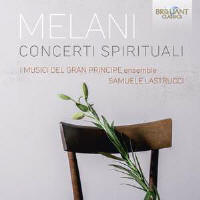Texte paru dans: / Appeared in: |
||||
|
Outil de traduction ~ (Très approximatif) |
||||
|
Reviewer: James
V. Maiello Alessandro Melani (1639–1703) was born and trained in Pistoia, a small Tuscan city with a surprisingly rich musical history. Melani’s father was the cathedral bell-ringer, and his brothers Atto and Jacopo were highly regarded, respectively, as a castrato and as a violinist-composer. After training and serving an apprenticeship in Pistoia, Alessandro followed the familiar path of working in smaller courts until moving to higher-profile positions in Rome, no doubt facilitated at least in part by the music-loving Pope Clement IX, also a Pistoiese.
Here, I Musici del Gran
Principe offer the first complete recording of Melani’s third collection of
concerted motets, 18 concerti spirituali for five voices, ripienists, and
basso continuo. The 1682 collection is dedicated to Fernandino de’ Medici,
Grand Prince of Tuscany, and the music reflects Florentine musical tastes,
despite Melani’s employment in Rome. Recorded in the intimate, yet resonant,
Cappella San Luca of the basilica Santissima Annunziata in Florence, the
ensemble fills the space without sounding crowded; the venue seems a perfect
choice for this repertoire. Although the music has clearly been well
researched, the liner notes are relatively brief, and texts and translations
are not supplied, which is a notable shortcoming.
Melani’s music is equally
appropriate for public liturgy and private devotion, and the collection
provides over two hours of music, likely written with Fernandino’s chapel in
mind. Every one of the singers maintains a versatile career that runs the
gamut from opera to music education, not just early music. This comes
through in the recording as they all provide service as soloists or
ripienists as needed. This is not to say that the singing is not
appropriate, stylistically. Rather, the singers are versatile and flexible,
deploying vibrato judiciously and breaking some of the more staid
constraints of early music performance practice to add weight and drama
tastefully. Bass Alessandro Ravasio, for example, shines in this repertoire,
weaving nimble lines through the texture with a pleasing richness that is a
reminder that he is also in demand for 19th-century operatic roles.
Francesco Marchetti’s tenor is similarly robust, though it never overpowers.
The soprano soloists are consistently fine, though Benedetta Corti stands
out for the sweetness of her tone and for her sensitivity, especially when
paired with Margherita Tani. The continuo ensemble provides both a solid foundation for the singers and nuanced, natural embellishments. Using a contrabass to augment the bass line is completely in line with Italian performance practice of the period, and it adds ballast to a lineup that might otherwise be overbalance toward the treble. Using plucked strings in addition to organ and harpsichord allows for a kaleidoscope of sounds from the ensemble. Keyboardist Anna Clemente’s name keeps coming onto my radar, and it is easy to see why given her and stylish continuo realizations here. Samuele Lastrucci deserves praise not only for his intelligent interpretations and unobtrusive direction, but also for bringing together a team that clearly works well together. I Musici del Gran Principe is relatively new to the early music scene, founded in 2017. They are representative of a flowering of new ensembles populated by young musicians. Their success and the success of this recording are encouraging bellwethers for the future of early music.
| ||||
|
||||
|
|
|
|||
|
Cliquez l'un ou l'autre
bouton pour découvrir bien d'autres critiques de CD |
||||




